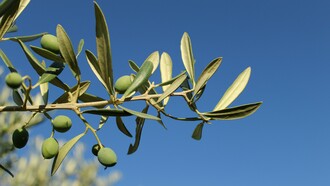I was familiar with the view because it was my fourth time in Macedonia and the third time in Bitola. But this time the minivan turned opposite to the old Jewish cemetery of Bitola, which is located at the entrance of the city, and we arrived to "Koco Racin" - Bitola, an institute for rehabilitation of children with hearing, speech, voice and other development problems.
I was part of an Israeli group of people from "SHEKEL - Community Services for People with Special Needs" in order to film the trip, and that was the first station on our trip. The purpose of that trip was to present to the Macedonians the special activities of "SHEKEL" regarding people with special needs and maybe to create collaboration in this field between our countries, Israel and Macedonia.
Miki Arnon, Head of the training of "SHEKEL," who was headed the small group, told me that the society treats adults with special needs as children even if their age is 45 and he would like to change that attitude so they would be treated as they were just ordinary people. While watching my colleagues to the trip, four of them with special needs, I understood and accepted what he was saying to me. They had acted like "Normal" adults and asked the local stuff the right questions, though they didn't understand why part of the local stuff were wearing white robes like that was a medical institute. Maybe that was the different between the perception of "SHEKEL" and the local perception, but I have not seen any different between them regarding to the time, patient, affections and dedication which the wonderful local stuff gave to the children who were staying at that time of our visit at the institute compare to "SHEKEL".
The children had arranged us an exiting performance with music using their hands and fingers because they were deaf. I looked at their happy faces while shooting my movie and some of them tried to grab my attention more then the others, dancing and posing like professional dancers in order to be shown in the movie or that their faces would be perpetuated in the camera of the charming Mrs. Tanja Dimitrievska, a member of the stuff. We were so impressed by that and also by the fact that they were waving the flags of Israel and Macedonia.
I think that on this point I should give the credit to our energetic ambassador to Macedonia, Mr. Dan Oryan, who's doing a lot in order to get the two countries closer in many fields. No wonder that after our visit at that institute we stopped at the Jewish cemetery in order to give our special people the opportunity to plant young trees with the volunteers of the Red Cross of Bitola together with Mrs. Mima Geras who's leading the project of the cleaning and conservation of the Jewish cemetery and contributed a lot for the success of that trip. The final chord was riding on bicycles which were donated by the Israeli Embassy to the Red Cross of Bitola; you should have seen the excitement on their faces.
Ambassador Oryan told me that: "Behind bringing the group of four special young people from the "SHEKEL" organization was the thought to gain two goals in one visit. The first goal was to share with the Macedonians how in Israel young people with disabilities are included, to get the young people to tell about it by themselves, to find partners to projects of inclusion using Israeli experience and know how. And to show the Israeli exhibition that was made on this topic and is very touching and special. The second goal was to have a great time and adventure for the four young people with disabilities from Israel, to get them to taste one of the liveliest and rich countries in the Balkans, meet people, see the beauty of the country, taste the amazing food and spend time with youth in Macedonia".
It was interesting to explore that the adults who I traveled with; each one of them was suffering from an autistic syndrome, were curious to know everything and by details. When we arrived to Ohrid airport they seat with the pilot in the cockpit and were in heaven. They set with the head of the Jewish community in Skopje and asked her many questions; they visited the foreign ministry of Macedonia and felt important people; they mingled with the people who were invited to the photo exhibition of one talented Israeli photographer, Lior Grundman, who took photos of people with special needs together with members of their families and they even asked the manager of another day care center for people with special needs in Ohrid few professional questions. Of course one could see that the attention of some of them was interrupted here and there, but aren’t we all, our attention, as "Normal" people wont distract from time to time?
So let me raise at this point a philosophical question, why we call people with special needs as such? Some of you probably remember that I have a brother with Down syndrome. Do you think that he hasn't had his own will? Well, you will be surprised. Maybe we are the one, the "Normal" ones, who own special needs. One of the most common needs which "Normal" people are pursuing in life is the need to be loved. You will be surprised again; people with special needs, if you ask me, are not pursuing it, inasmuch as no one is capable not to love them. But during that trip I met "Normal" people who exposed in front of me their needs for good life, love and money, which brought me to the conclusion that maybe we are all special people with special needs and if we learn and teach each other to accept one each other as normal human beings, even if each one of us has a disability of any kind or a "scratch" then our global society will find its inner peaceful. And concerning the goals of our trip I will quote His Excellency, Ambassador Oryan: "The second goal was very successful, as for the first, time will tell if we found the right partners".















